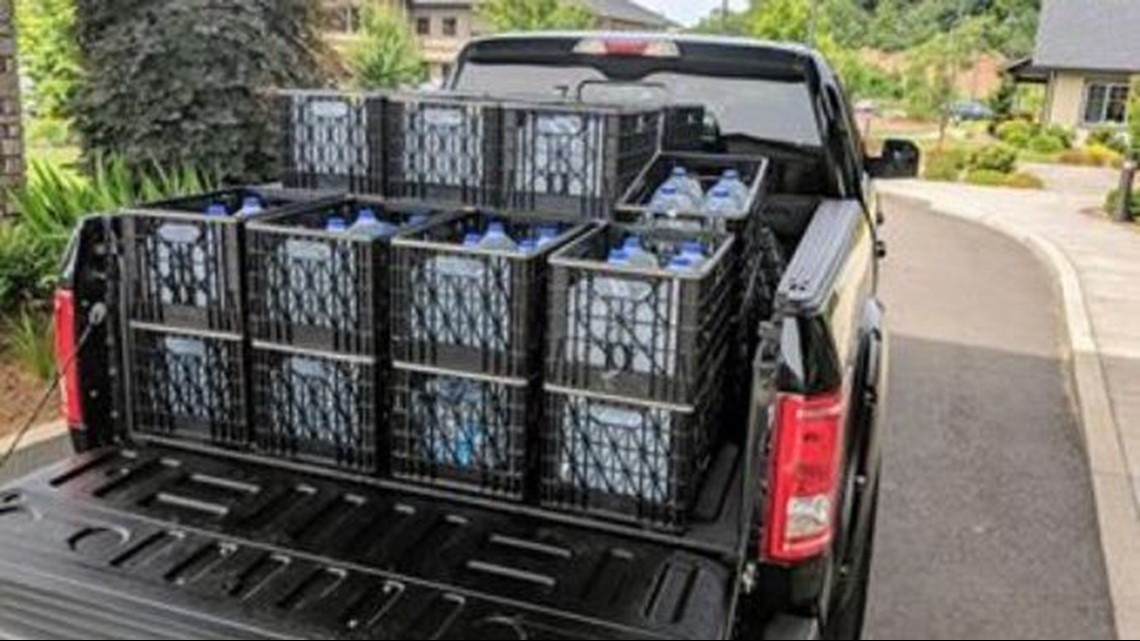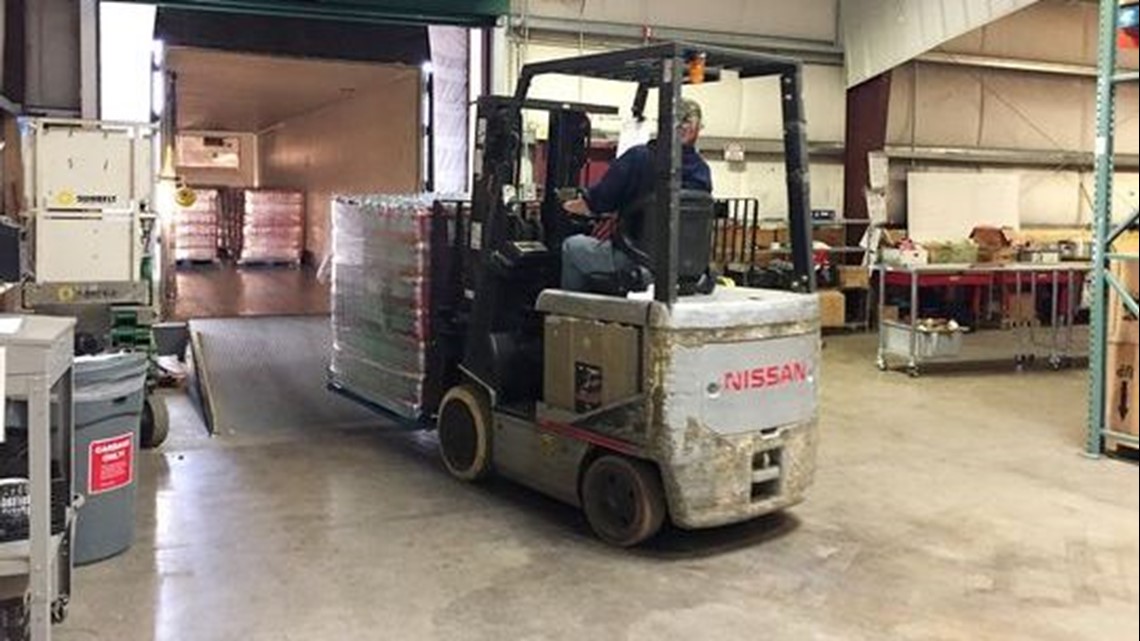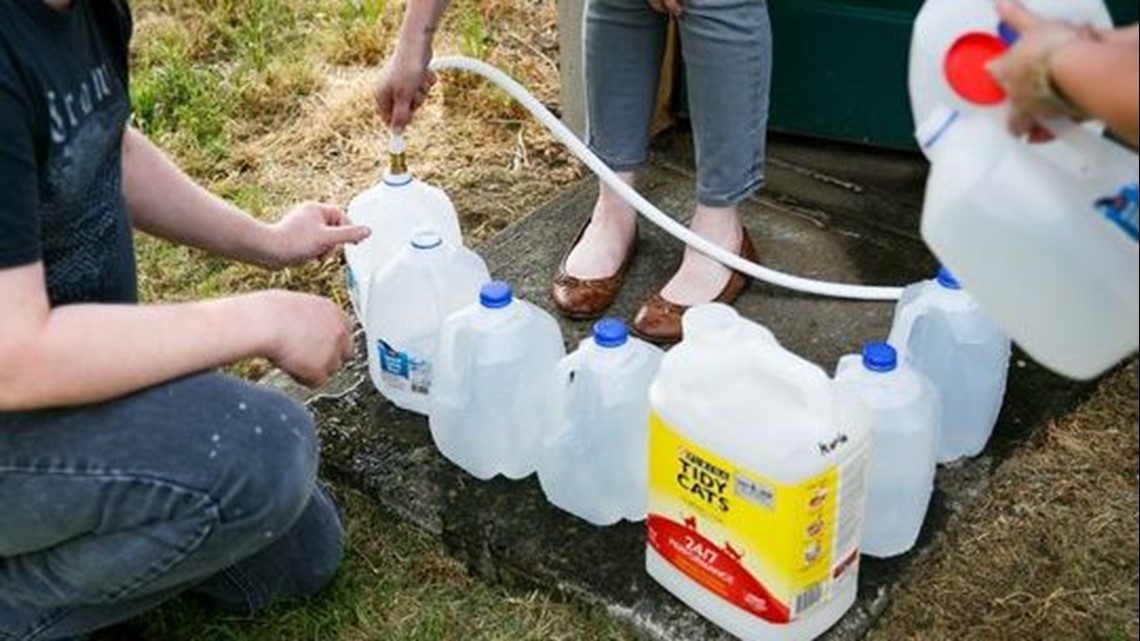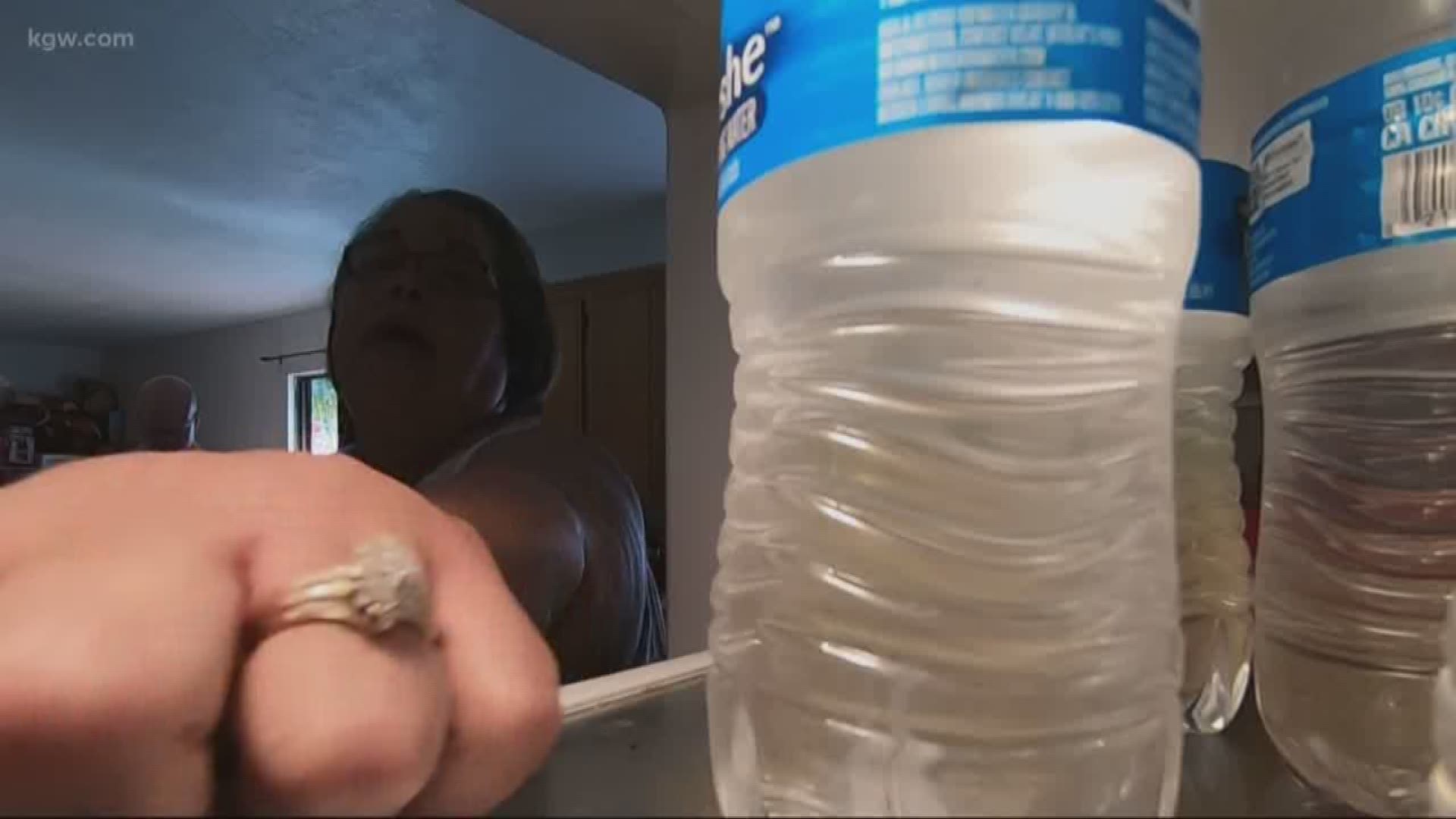Salem residents drove as far as West Linn in search of bottled water Wednesday following the city’s announcement that its drinking water is contaminated.
Those without the time or means to go out of town were temporarily out of luck as store shelves went empty.
Officials told residents to keep checking with local retailers.
“There should be a supply of water coming into stores,” Cory Grogan, spokesman for the state Office of Emergency Management said. “It benefits them economically to be distributing water.”
Major retailers such as Costco and Roth’s said they were expecting water shipments, but didn't know exactly when they would come in
“We are out of water at the moment,” Costco manager Larry Kelley said.
Major retailers such as Costco and Roth’s said they were expecting water shipments, but didn't know exactly when they would come in
“We are out of water at the moment,” Costco manager Larry Kelley said.
Late Tuesday, Salem announced that an algae bloom discovered a week ago in Detroit Lake is producing low levels of toxins.
Children younger than 6, people with compromised immune systems, people receiving dialysis treatment, people with pre-existing liver conditions, pets, pregnant women or nursing mothers, or other sensitive people should not drink the water, the city said.
Bottled water should be used for drinking, making infant formula, making ice and preparing food and beverages for those groups.
The advisory was extended for an unspecified period when new test results came in on Thursday. The city is prepared to activate points of distribution for water, emergency manager Greg Walsh said.
As of 12 p.m. Thursday, officials had not determined where those distribution locations would be, where the water would come from, or whether they will give out bottles or ask people to bring their own containers.
Gov. Kate Brown's office has been monitoring the situation and is lining up resources to help if Salem and Marion County request it, her spokesman Bryan Hockaday said.
"The Governor's Office is exploring all available options in terms of assets and resources that can be made available to water users of Detroit Lake," he said. "We are ready to provide those at a moment's notice."
Price gouging reported
Reports of price-gauging began appearing on social media by Wednesday morning.
North Salem resident Makaela Yates said she went in search of water around 11:30 p.m. Tuesday.
At her first stop, a gas station market, a 24-pack of Arrowhead water was priced at $47, she said.
She thought it was a joke until she saw another customer purchase one.
"I watched it get rung up and everything," she said. "It was insane."
State officials are encouraging residents to report price gouging to the Oregon Department of Justice at 877-877-9392.
Crisis brings out the best in residents
Meanwhile, Keizer businesses banded together to offer their taps to their larger neighbor. Unlike Salem, Keizer gets its drinking water from wells.
It all started when Nigel Guisinger, owner of Willamette Valley Appliance, called the Keizer Chamber to say, if anyone called needing water, to send them his way.
“I sent an inquiry to our members,” said Danielle Bethell, Keizer Chamber of Commerce executive director. “We took to Facebook and said, if you need water, here’s a list of businesses where you can get it.”
The list also includes Salem-Keizer Volcanoes, Delaney Madison Grill, Bonaventure at Keizer Station and Keizer Little League.
A full list is available on the Chamber’s Facebook page.
“It’s just Keizer trying to be neighborly and support our community,” Bethell said.
Early Wednesday, Brett Downes called Salem Transitional Care to check on his mother, a patient at the Southeast Salem nursing home.
He found out they didn't even have enough water to make coffee.
"I called every store I could around the Salem area all the way to Wilsonville," said Downes, a loan officer at Willamette Valley Bank.
Finally, he found a Safeway store in West Linn with supplies. With his employer's approval, he spent about four hours driving to the Portland suburb, loading up 160 gallons of water, and delivering it to the home.
"The entire staff was out there full of smiles," Downes said. "They're able to cook now."


Impacts felt throughout Salem
Throughout the city, coffee shops and restaurants curtailed operations or closed their doors.
"We cannot cut our potatoes, lettuce and any other vegetables as we use water," Nancys Burgers & Fries wrote on its Facebook page. It asked customers of its three salem restaurants to go to its Keizer location.
Bonaventure, which operates two of Salem's largest senior living facilities, keeps stockpiles of emergency supplies.
"We have different contingency plans for situations like this," regional operations manager Caleb Gray said. "All of our residents have water and everything is operating as normal."
The water supply at Salem's four correctional institutions was affected, state officials said. The Department of Corrections is supplying bottled water to inmates with compromised immune systems, and has made medical staff available for those experiencing symptoms
Salem schools
Salem-Keizer Public Schools secured 100,000 water bottles Tuesday evening and have yet to use them all.
The district distributed more than 30,000 water bottles Tuesday night to preK and elementary school students, as well as about 200 students and staff who are medically fragile, nursing or pregnant.
The district is working directly with distributors — including Mineral Springs Bottling Co., Coca-Cola and Sodexo, the district’s food management service — to obtain more over the course of the week, said Lillian Govus, a spokeswoman for the district.
Additionally, Govus said Nestle is donating 75,000 water bottles to the district.
The district's purchasing department is also reaching out to retailers such as Walmart and Fred Meyer to see if there are any more bottles they can buy.
Govus said the district delivered another wave of about 46,000 water bottles Wednesday evening and Thursday morning to get students and staff through the week.
Schools in Keizer are excluded since they get their water from a different supply.
Successful meal preparation measures have been taken in schools so cooks can use bottled water or make meals without water, Govus said. "We're not at 'peanut butter and jelly' status," she said.
The district is not utilizing ice machines right now and has reached out to Marion County officials for direction on what, if anything, needs to be done to its systems when the advisory is lifted.
The district is also making plans to address the increased recycling needs because of the water bottles, Govus said. The district is prepared to support schools through the end of the week, she said, and is looking for additional supplies to go into next week.
Officials did not have a cost estimate for the water bottles at this time.
Good Samaritans take action
Adam Wilhite and Shawna Hermans were closing up the Shell gas station they work at near Albany when a family came in, desperate for water.
A mother, father and young boy — who Wilhite and Hermans believe was probably 3 or 4 years old — came in asking if the station still had any left.
"We were a bit taken aback and thought, 'Of course. We always have water,'" Wilhite said.
The Salem family had driven out to Albany since all the stores near them were out and it was late at night. They bought six one-gallon jugs and a pack of 24 bottles.
This family was just one of the tens of thousands of Salem residents likely affected by the contaminated water supply.
"We had no idea the impact was so severe," Wilhite said. The two started researching what was going on and heard some people were selling bottled water for $40 a pop.
"That's not OK," Hermans said. "People can't afford that ... water should be available to (everyone)."
So Wilhite and Hermans got an idea — The two took Hermans' SUV to the Walmart in Lebanon and bought 126 gallons of water to give to people, free of charge.
Wednesday morning, the two drove to Salem before 7 a.m. and set up camp in a Java Crew parking lot in West Salem. The two estimated 40-50 cars stopped to get water. They were out in an hour.
Wilhite said they weren't trying to make money. "You can't take clean water for granted," he said.
One person stood out to Wilhite and Hermans — a mother who couldn't afford to buy water, but whose son needed it for medical reasons.
She told them her son has been in and out of Doernbecher Children's Hospital and needs clean water to take his antibiotic. She couldn't afford to buy any but insisted they take the dollar and change she had for the gallons she took.
"It was a very emotional and rewarding experience," Wilhite said. "That community is amazing."
The two plan to stay updated on the need in Salem and help any way they can. They said they could bring more water Friday if needed.
Marion-Polk Food Share
The Marion-Polk Food Share, based in Salem, is working with partners statewide to get water to the area's most vulnerable populations.
The nonprofit included a water bottle with every meal delivered for Meals on Wheels in Salem Wednesday. The Meals on Wheels program delivers about 400 hot meals to seniors and disabled adults in Salem and Keizer every day.
Additionally, water bottles were delivered to seniors at Center 50+ and the South Salem Senior Center. Salem- and canyon-area pantries were also told about additional water bottles available through the food share.


The food share doesn't have a daily count on the number of people who access area pantries, but about 40,000 people utilize the pantries in Marion and Polk counties every month, officials said.
Julie Hambuchen, vice president of Development, Marketing & Communications at the food share, said they gave out three pallets of water Wednesday morning or approximately 48,000 water bottles.
The food share is reaching out to partners to see if they can send additional water to Salem, as well as contacting larger donors. The Oregon Food Bank sent 18 pallets of water down Wednesday evening or approximately 288,000 bottles of water.
"We don't, independently, have the resources to meet the entire need," Hambuchen said. She advised people in need to look to their neighborhood pantries as one part of the solution.
Though pantries typically have an income qualification to access their services, they will be giving out water to anyone in the affected categories on Thursday, regardless of income.
The food share is watching to see what direction is given by the city and Marion County officials as well and will help any way they can.
Home health care providers, for example, will be able to get water bottles from the food share to take to patients who are affected.
Willamette Humane Society, pet advice
The Willamette Humane Society in Salem faced a large problem with the water contamination this week since the more than 100 animals in the shelter rely on city water.
Willamette Humane Society officials said they use about 2,000 gallons of water a day to water the animals, clean and more.
Thankfully, the humane society also has a well on site with a pump house, said Callie Gisler, community engagement and marketing director for the shelter.
As about a dozen staff members and volunteers waited for the generator to start working Wednesday, they formed an assembly line and carried buckets and jugs of water from the well back up to the cats and dogs.
The shelter plans to open the pump house to community members in need of water for their pets.
Gisler advised pet owners in the area to avoid tap water for their pets until the advisory is lifted.


Pet owners should also pay attention to any signs or symptoms that may indicate their animals are not feeling well, she said. This includes fatigue or lethargic behavior, excessive secretion or salvation and shallow breathing to the more extreme symptoms, including bloody stools, vomiting and diarrhea.
Extremely rare symptoms could include jaundice, seizures or blue discoloring of the skin or gums.
"It can be a cause of death, so it's not something to ignore," she said. With the proper medical care, Gisler said animals usually make full recoveries.
Gisler said they haven't seen any of these symptoms in the shelter as of Wednesday afternoon and humane society officials won't give specific medical advice.
However, if pet owners are at all concerned, she said, they should contact their vet. If more extreme symptoms, such as vomiting or discoloration, occur — and especially if they persist for more then 24 hours — owners should seek emergency vet care.
Staff and volunteers will be at the Willamette Humane Society, 4246 Turner Rd SE, until 7 p.m. Wednesday night and from 10 a.m. to 7 p.m. Thursday to help people and their furry friends get water.
For additional questions, contact the shelter at 503-585-5900.
Contact Natalie Pate at npate@StatesmanJournal.com, 503-399-6745 or follow her on Twitter @Nataliempate or on Facebook at www.Facebook.com/nataliepatejournalist.

